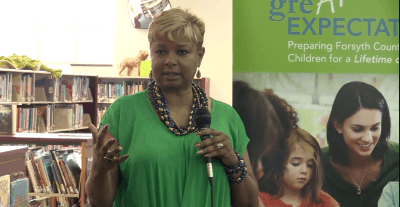
For 25 years, one organization has been working in the foothills of North Carolina to educate the public about the importance of early childhood learning while at the same time empowering parents and educating providers.
The Work Family Resource Center operates in a nine-county service region that includes Alleghany, Ashe, Davidson, Davie, Forsyth, Stokes, Surry, Wilkes, and Yadkin. It is an ambitious geographic reach for a modest staff housed in an unassuming office in downtown Winston-Salem.
But for Katura Jackson, the Center’s executive director, and her team of family and provider specialists, the work is not only about increasing access to quality programs for children and families, it’s also about the health of communities.
“Our actual mission is to engage child care programs, enrich families, and enhance the community,” Jackson said. “That’s what we do all in a day, just working with families around child care issues, working to improve the quality of child care programs, and then trying to help the community come up with solutions to challenges that families and child care programs might be facing.”
https://youtu.be/c2AyHWGbtO0
The Center operates from the premise that a better educated parent, a more informed consumer of their child care options, will be a happier, more relaxed parent — a parent who is comfortable leaving his or her child in a trusted child care setting.
In the short term, that equates into community members who can more fully focus on success in their jobs or completing their education, which results in a community comprised of better educated residents with more living-wage careers.
“It allows them the opportunity to go out and work, and if they find a provider through us, and they’ve used the materials that we’ve given them, it helps them have a little peace of mind,” said Donna Bell, the outreach coordinator at Work Family Resource Center. “Because they know they’ve used those quality indicators in order to find a place that is right for their child.”
In the long term, for the future health of a community, it means more children who have started their education early and are more fully equipped with the tools they need to be successful at school and in life.
“When children have good early learning opportunities, then they are better prepared for school,” Jackson said. “You hear a lot about the lag in school, the third grade end-of-grade tests not being good, students not being prepared, and so if you started at birth, which is when children start learning, then by the time they get to kindergarten you don’t have to do as much remedial education.”
https://www.youtube.com/watch?v=CMwC_n9VspA&feature=youtu.be
According to Jackson, who has worked at the center for 16 years, the Work Family Resource Center assists approximately 3,000 families a year in its nine-county region, about 2,000 of which are based in Forsyth County, the most populous county in its service area.
And though the goal and quality of service is the same in each county, working in smaller communities can provide challenges for educating parents and connecting them to resources.
https://youtu.be/mmDhBpVz-3Q
Work Family Resource Center receives funding from a variety of sources, including the N.C. Division of Child Development. The organization also administers the Smart Start Family Child Care Scholarship program for Forsyth County. The scholarships are income dependent and participating families are required to pay at least a portion of the monthly child care cost.
The Center also offers a program for corporate clients, a service that helps educate employees on child care and provides them options for child placement. “It’s cutting down the time employees spend away from the job looking for child care,” Jackson said.
The Center is then able to use those fees generated from corporate clients to help more low-income families. “We use that to support the work we do in the community with other families,” Jackson said. “Our corporates are our in-kind match to pull down federal, state, and local dollars.”
https://youtu.be/0io1gNCV914

At the core of the Work Family Resource Center’s mission is provider training and education. The Center provides ongoing professional development and technical assistance to child care providers in its service region. It also creates learning communities where providers can interact and learn from peers in the region.
Regional providers connect to the Center through a variety of ways, sometimes word of mouth, sometimes through the flyers the Center sends directly to providers, sometimes through recommendations from state agencies.
For child care provider Tonya Simmons, the Work Family Resource Center has been a partner since she opened her child care facility seventeen years ago, and has been critical in helping her maintain her five-star rating.
“I have been a five-star since I have opened my establishment, and without Work Family Resource Center, I would not have been able to achieve those goals in my life and in my career,” Simmons said.
https://youtu.be/lsdeglM0GSU
Center-Based Child Care
Sandy Weaver, an infant-toddler specialist at Work Family Resource Center, works with licensed child care centers in their infant-toddler classrooms. The Center provides ongoing professional development training to infant-toddler teachers in the nine-county region throughout the year. It also provides technical assistance to providers, helping them prepare for the state’s environmental rating scales assessment, which determines a facility’s star rating.
Weaver coaches classroom teachers on curriculum development, helping them optimize room layout and making sure they have appropriate educational materials. She also helps them with sanitation issues and health-related issues, like proper diapering procedures.
Prior to the state visit, Weaver conducts a mock pre-assessment visit with the centers and then does a mock post-assessment, after they have had time to implement the Center’s recommendations. “Our goal is that there is growth from the pre- to the post-,” Weaver said.
Weaver and the other infant-toddler specialist manage anywhere from 15 to 18 classrooms a year. “They really value us coming in because they see us as a partner,” Weaver said. According to Weaver, the assessments are free of charge to providers in the Center’s nine-county service region.
Family Child Care Homes
Work Family Resource Center’s Stars and Beyond program is specifically for family child care homes in Forsyth County. According to Vonya Washington, a trainer and provider specialist, it is one of only a few programs of its kind in the state of North Carolina.
A family child care home is where a provider has taken space out of their house to create a child care facility, it could be anything from a single living room to an entire home.
“A lot of parents like the child care home environment, especially for children birth through age three, just because of the intimacy and low teacher-to-student ratio,” Washington said. “Family child care providers not only have a special rapport with parents but also with the extended families of the children they serve.”
According to Washington, the setting is appealing to parents because of the deep connection between the provider and child. She believes the communication between parent and provider tends to be at a higher level as well, which results in positive relationships that may account for less turnover than in a traditional child care center. In a family child care home, children have a relationship with one caregiver, which can build consistency and trust.
Like any other child care facility, family child care homes have the option to undergo an environmental rating scale assessment, a physical visit that measures a facility based on a wide range of indicators.
The Stars and Beyond program offers pre- and post-mock assessments prior to the official state visit. This allows providers to see any changes that need to be corrected or various types of interactions that need to be improved.
“When they are given their license, they are one star,” Washington said. “After six months, they can apply for higher stars, and that’s where the Stars and Beyond program comes into play.”
Much as Weaver does with the center-based technical assistance, the Stars and Beyond program lets specialists visit the homes and observe providers’ interactions with children, review educational materials, and the physical layout of the care area. They make sure it is a safe and appropriate learning environment for children.
Like any other child care facility, family child care homes are required to undergo an environmental rating scale assessment, a physical visit that measures a facility based on a wide-range of indicators.
“They are looking at all these quality indicators, and they score them,” Washington said. “And based on that score…they can receive receive three to five stars.”
The Stars and Beyond program offers mock assessments prior to the official state visit, and then returns for another visit to see if the provider has followed through on their recommendations.
Based on the outcome of that assessment, the Stars and Beyond program can then offer a grant to the provider — funds to purchase additional enrichment materials for their family child care home.
Although the official rated license assessment occurs every three years, the specialists provide continuous technical assistant to the providers in the county.
“We offer Communities of Practice and trainings on various topics,” Washington said. “For example, if we have a group of providers that are going through the environmental rating scale, we will offer a training that is specifically focused on the rating scale. We will explore topics of what the assessor is expecting to see when they come into your program, explanation of terms used in the rating scale, what does a typical day consist of, and what materials are age appropriate and in which centers do they belong in.”
According to Washington, there are 101 family child care home providers in Forsyth County.
Washington points out the misconception that family child care homes are cheaper than typical child care centers.
“It’s a misconception, because [the public] thinks, ‘Oh, it’s a home, it’s a baby sitter,'” Washington said. “But these ladies have education. A lot of them have associates degrees. We have several that have bachelor’s degrees. And we have two that have their master’s degrees. We have former teachers that have come out of the public school system and opened up a family child care home.”
“These kids are getting a curriculum — a curriculum that is approved by the state,” Washington said. “These children are learning the fundamentals of reading, writing, how to interact with peers. These children are learning the same things they are learning in pre-school programs, Head Start, and More-at-Four programs. So they are charging what their worth is.”
Professionalization and Public Recognition
Sandy Weaver believes that early childhood educators and providers don’t get the support and appreciation they need. She would like to see that change in the next five years.
“I think there are teachers sometimes that just don’t get the pat on the back that they need,” Weaver said. “They really are doing good things for children, they just don’t hear it enough. [We just need to] really continue to give teachers that push to know, you are doing the right thing and children do benefit from what you give them every single day.”
Donna Bell agrees, and would like to see an increased professionalization of the job in the future and a greater awareness that a child’s education doesn’t start at kindergarten.
“Not only recognition, but the compensation that they need because that’s really important” Bell said. “And for the general public to recognize that this is a very worthy profession and that the education of their children at a young age will in turn affect the economic base of everything. If you don’t have well educated people, you can’t run businesses.”
“Our providers are stressed,” Jackson said. “Child care is a low-income job, basically. We don’t pay child-care teachers what they need to be paid to do the important work of raising our young children.”
https://youtu.be/UpczlKLEdP0

Katura Jackson believes that the first step in educating parents about their child care options is educating them about the importance of early childhood learning.
“When children have good early learning experiences then they are better prepared for school, and then if you are prepared for school you’re prepared for life,” Jackson said.
It also means making sure parents get the help they need to meet their and their child’s basic needs. Parents who are worried about housing or diapers are distracted parents who have less time and bandwidth to interact with their young children.
https://youtu.be/3F5cQkrEryo
“We can help them locate other resources as needed, like housing or food,” said Greizy Beckles, one of three parent specialists at Work Family Resource Center. “Sometimes parents make a phone call for one thing, but we realize they need more than that.”
In her role as a parent specialist, Beckles receives a daily stream of phone calls from residents in the nine-county region, looking for child care, preschool, and before- or after-school care for their children.
“We educate the parents about what is important to look for in quality care,” Beckles said. “To look for providers that are licensed. So our goal is just to give them the tools that they should use in order for them to make the right decision.”
Work Family Resource Center provides parents with a list of three-star rated or higher child care facilities in close proximity to their home address. According to Jackson, the Center aims to empower parents to be knowledgeable consumers. They work with them to find a placement that is convenient, within their budget, and conducive to their work hours.
https://youtu.be/QnbZ5V3loeE
Parents are frequently referred to the Work Family Resource Center by various community organizations, including the Department of Social Services. When a parent qualifies for a child care voucher, to help offset the cost of child care, they are frequently referred to the Center by DSS, according to Beckles.
“A lot of parents, they’ve been able to afford better housing, they’ve been able to graduate from school, they’ve been able to make better decisions based on the information we provide to help the kids have success in school when they go to kindergarten,” Beckles said. “It’s very rewarding to hear from parents, to hear what we did or what we are telling them has made a difference in their lives.”
Kimberly Sims came to the Center in 2002, when, as a student at Winston-Salem State University, she was looking for child care for her newborn so she could continue her studies.
Simms says that without the resources she was connected to through the Center and the support of its staff, she would not have been able to finish her undergraduate degree and then maintain full-time employment.
“There’s no way I would be able to have my full-time job and make the income that I need to make,” Simms said. “Even though I still qualify for assistance, [having a job lets me] provide for my family in other ways.”
https://youtu.be/RxBHUGpbEQE
Simms also understands that the assistance from Work Family Resource Center, the ability to place her daughter in a quality, highly-ranked child care center, is helping her child prepare for kindergarten.
“They are preparing them in that early childhood stage for the primary stages moving forward,” Simms said. “It’s good to be able to have them at a quality center that is going to get them ready academically to move forward.”
It also gives her daughter the needed social skills to make the transition into kindergarten.
“That’s always one of my concerns: is if I had to stay at home with my child and not be able to have them around other kids,” Simms said. “Just for them to have the opportunity to socially be able to connect to other kids, I know is good for them as well.”
https://youtu.be/6OpbAXcma3M
Margel Campos was connected to the Center almost two years ago, when the person caring for her children while she worked took a full-time job. It left the recently certified nursing assistant with the tough choice of leaving her position to stay at home with her children full time or seeking assistance so she could keep working.
Through a friend, Campos heard about the Work Family Resource Center. She contacted them directly and learned she was eligible for child care assistance.
https://youtu.be/DRsgfMLlluQ
Without the assistance, Campos says she would probably not have been able to keep her job and continue her education. Without help from the Center, Campos says she would be staying at home and caring for her children full time.
Campos has noticed a big change in her daughter since she started at her new daycare.
“I’m surprised with how she has grown,” Campos said. “She was such a closed-in child. She really didn’t like to speak with no one, because she didn’t have anyone but me and her brother. Like really shy. Then it’s like her bubble really expanded, and now she’s not shy to go up to you and say, ‘Hi, what’s your name?’ And, ‘I can count to 10.’ And, ‘I can do this.'”
https://youtu.be/6xl-jm_gVJY
Campos even noticed a difference for her oldest child, who only attended a preschool for a brief period before the start of kindergarten. She believes the preschool experience gave him the confidence socially and the skill set academically for an easy transition.
“That’s what [preschools] do. They teach them,” Campos said. “It’s not just, ‘Oh, we watch your child.’ It’s ‘We’re teaching your child.'”
Campos is realistic about the possibility of her ability to send her children to their preschool without assistance from Work Family Resource Center. As a single mother of two children, working full time and going to school would not have been possible without reliable child care.
“Work Family Resource only offers the best and helps you with the best,” Campos said. “Even though you are on a financial budget, that doesn’t mean you have to strive for the lowest thing…They are trying to give you the best that they can give you.”
Campos is grateful for the opportunity.
“If it wasn’t for this service, I wouldn’t have been able to pay for daycare. So I wouldn’t have been able to come as far as I have came in the past two years. I feel like this service has made me grow into a better person,” Campos said. “It’s made me realize that it doesn’t matter if you get assistance or not. It’s what your doing with your life and how you are taking and applying what you get.”
https://youtu.be/686E20giuyE


